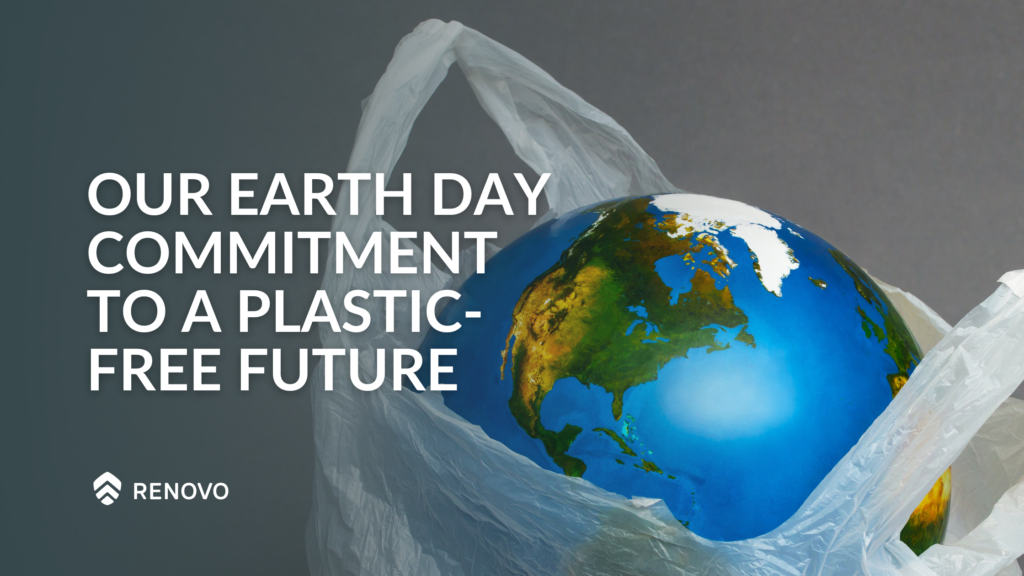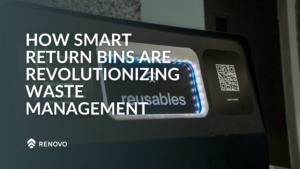As Earth Day approaches this year, the global focus intensifies on the urgent threat that plastics pose to our environment. We aim to end all single-use plastics and accelerate the adoption of sustainable alternatives. Renovo stands at the forefront of this crucial movement. Join us as we spotlight the imperative to eliminate single-use plastics and champion the adoption of reusables, paving the way for a cleaner, greener future.
Redefining Consumption Patterns
In 2019, British Columbia threw away over 340,000 tonnes of plastic stuff, like bottles and packaging. That’s like each person tossing out 65 kilograms of plastic every year! Most of this waste comes from single-use items, especially packaging, making up 40% of all plastics thrown away.
But here’s the good news: by using reusables instead of single-use items, we can make a big difference. Studies suggest we could avoid throwing away 50% to 75% of single-use stuff, potentially saving over 150,000 tonnes of plastic waste every year!
Through better cleaning and making reusables easier to use, we hope to avoid tens of thousands of kilograms of single-use packaging waste each year.
Looking ahead, we believe that with more people using reusables, we could prevent a huge amount of waste. Imagine if we could stop 90% of takeout containers and coffee cups from being thrown away! That’s billions of kilograms of waste each year.
By making simple changes, like using reusables instead of single-use items, we can all play a part in reducing plastic waste and protecting our planet for the future.
Raising Awareness and Inspiring Action
As advocates for environmental stewardship, we’re leveraging our platform to raise awareness about the harmful impacts of single-use plastics and the benefits of reusable alternatives. Through educational campaigns, social media initiatives, and community outreach efforts. We’re inspiring individuals and businesses to take action. Whether it’s refusing single-use plastics, supporting sustainable brands, or advocating for policy change – we’re mobilizing a movement towards a plastic-free world.
We hope you’ll join us in taking action to embrace a plastic-free life, incorporate reusables into your daily routines, and participate in Earth Day initiatives. Let’s make every day Earth Day a reminder to make daily conscious choices that contribute to a healthier planet for future generations.
You Make a Difference
Earth Day initiatives don’t have to be complicated or time-consuming. Here are some easy and impactful ways you can make a difference:

1. Reduce Single-Use Plastics
Say no to plastic bags, straws, and utensils. Opt for reusable alternatives like cloth bags, stainless steel straws, and bamboo utensils. In our quest to help eliminate single-use plastics, we’re proud to share our collaboration with companies like Reusables. They share our vision for a plastic-free future. By promoting their innovative products and solutions, we’re empowering our clients and communities to make the switch to reusable alternatives. Together, we’re driving meaningful change and reducing our collective environmental footprint.
About Reusables
Reusables is on a mission to tackle single-use packaging waste in our local communities and beyond.
In today’s world, convenience often comes at a high environmental cost, particularly when it comes to single-use plastics. These materials don’t decompose, leading to a staggering amount of waste that’s piling up in our communities and harming our planet. Globally, we’re producing about 300 million tonnes of plastic each year — equivalent to the weight of the entire human population! Shockingly, around 60% of this plastic ends up in landfills or polluting the natural environment.

Recognizing the urgent need for change, Reusables was founded in 2020 by Anastasia Kiku and Jason Hawkins, right here in Vancouver, BC. Their journey began during the height of the COVID-19 pandemic when we witnessed the surge in single-use packaging due to increased takeout orders. Determined to make a difference, they started by assisting four local restaurants in East Vancouver to offer zero-waste packaging options to their customers.
Driven by their passion for sustainability and innovation, they’ve set out to break down the barriers to reuse and design a new solution that would revolutionize the way we consume and package food. Today, Reusables is proud to be working with enterprise food service operations across North America and partnering with over 100 food businesses right here in Canada.
At Reusables, we believe that every small change adds up to make a big difference. By providing accessible and practical alternatives to single-use packaging, we’re empowering individuals and businesses to make more sustainable choices for our planet. Follow them and support their journey to reduce single-use packaging waste and build a healthier, greener future for all.
2. Go Paperless
Sign up for electronic statements and bills to reduce paper waste. Use digital tools for note-taking, scheduling, and communication whenever possible. Fun fact there are ways to reduce your digital carbon footprint!
Streaming Wisely: Streaming services like Netflix, YouTube, and Spotify contribute to carbon emissions through data centers and internet infrastructure. By choosing lower resolution options, downloading content for offline viewing, and limiting streaming hours, you can reduce your digital carbon footprint.
Email Efficiency: Did you know that every email you send has a carbon footprint? The energy used to power servers, data centers, and network infrastructure adds up. Minimize your email’s carbon footprint by keeping messages concise, avoiding unnecessary attachments, and unsubscribing from newsletters you don’t read.
Cloud Computing: Cloud services are convenient, but they also require vast amounts of energy to power and cool data centers. Be mindful of the files you store in the cloud and regularly delete or archive unused data to reduce your digital carbon footprint.
Green Web Hosting: When creating a website or blog, choose a web hosting provider that prioritizes renewable energy sources. Green web hosting companies use energy-efficient servers powered by renewable energy, helping to reduce the carbon footprint of your online presence.
Digital Detox: Taking regular breaks from digital devices not only benefits your mental health but also reduces your digital carbon footprint. Spend time outdoors, engage in offline activities, and enjoy face-to-face interactions with friends and family.
3. Conserve Energy
Here are the main three ways you can easily help conserve energy at your home and in your life:
Turn Off: Many electronic devices continue to consume energy even when they’re turned off but still plugged in. This phenomenon, known as standby power or vampire power, can account for a significant portion of your electricity bill and contribute to unnecessary energy consumption. By making a habit of turning off lights, appliances, and electronics when they’re not in use, you can reduce standby power consumption and lower your overall energy usage.
Switch to Energy-Efficient LED Light Bulbs: LED (Light Emitting Diode) light bulbs are more energy-efficient than traditional incandescent or fluorescent bulbs. They use less electricity to produce the same amount of light, which can result in significant energy savings over time. Additionally, LED bulbs last longer than traditional bulbs, reducing the frequency of replacements and further decreasing environmental impact. By replacing your old light bulbs with energy-efficient LED bulbs, you can save energy and reduce your carbon footprint.
Unplug Chargers When They’re Not Charging: Chargers for electronic devices, such as smartphones, laptops, and tablets, continue to draw power from the outlet even when the device is not connected. This standby power consumption, while relatively small for individual chargers, can add up over time. By unplugging chargers when they’re not in use, you can eliminate standby power consumption and reduce unnecessary energy waste. This simple habit can contribute to lower electricity bills and a smaller environmental footprint.
4. Plant Trees
Participate in tree-planting initiatives in your community or start a garden at home. Trees help absorb carbon dioxide and provide essential habitat for wildlife.
Research Local Initiatives: Look for tree-planting events or community gardening projects in your area. Check with local environmental organizations, parks departments, or community centers to find out about upcoming opportunities to get involved.
Volunteer: Sign up to volunteer for tree-planting events in your community. These events are often organized by local environmental groups or government agencies and provide hands-on opportunities to plant trees and contribute to reforestation efforts.
Plant Native Species: When starting a garden at home, choose native plant species that are well-suited to your local climate and soil conditions. Native plants require less water and maintenance, support local wildlife, and help create biodiverse habitats. Some examples of native plant species suitable for gardens in Vancouver include:

- Pacific Dogwood (Cornus nuttallii)
- Red-flowering Currant (Ribes sanguineum)
- Douglas Aster (Symphyotrichum subspicatum)
- Sword Fern (Polystichum munitum)
- Oregon Grape (Mahonia aquifolium)
Create Habitat: Design your garden to provide habitat for wildlife, such as birds, butterflies, and pollinators. Include a variety of plants with different heights, textures, and flowering times to attract a diverse range of species.
Practice Sustainable Gardening: Use organic gardening practices to minimize environmental impact and conserve resources. Compost kitchen scraps and yard waste to create nutrient-rich soil, use mulch to retain moisture and suppress weeds, and avoid chemical pesticides and fertilizers.
Educate and Inspire Others: Share your love of gardening and tree-planting with friends, family, and neighbors. Encourage others to join you in creating green spaces and fostering a deeper connection to nature in your community.
By participating in tree-planting initiatives and starting a garden at home, you can make a positive impact on the environment, support local wildlife, and create beautiful green spaces for everyone to enjoy.
5. Support Sustainable Brands
Choose products from companies committed to environmental sustainability and ethical practices. Look for eco-friendly certifications and packaging.
Research Brands: Take the time to research brands and companies before making a purchase. Look for information about their environmental policies, sustainability initiatives, and ethical practices on their websites or through independent sources.
Check for Certifications: Look for eco-friendly certifications and labels on products, such as the Forest Stewardship Council (FSC) certification for sustainable wood products, the USDA Organic seal for organic food and agricultural products, and the Fair Trade certification for ethically sourced goods.
Consider Packaging: Pay attention to the packaging of products you buy. Choose items that are minimally packaged or packaged in eco-friendly materials, such as recycled paper, cardboard, glass, or biodegradable plastics. Avoid products with excessive or non-recyclable packaging whenever possible.
Support Sustainable Materials: Look for products made from sustainable materials, such as bamboo, hemp, organic cotton, recycled plastic, or reclaimed materials. These materials have lower environmental impacts compared to conventional alternatives and help reduce resource consumption and waste.
Research Supply Chains: Learn about the supply chains of the products you buy and choose companies that prioritize transparency and ethical sourcing practices. Support brands that engage in fair labor practices, pay fair wages to workers, and ensure safe working conditions throughout their supply chains.
Support Local: Whenever possible, support local businesses and artisans who prioritize environmental sustainability and ethical practices. Buying locally reduces transportation emissions, supports the local economy, and fosters a stronger sense of community.
Vote with Your Wallet: Use your purchasing power to support companies that align with your values and principles. By choosing products from environmentally sustainable and ethically responsible brands, you can help drive positive change in the marketplace and encourage other companies to follow suit.
By making informed choices and supporting companies committed to environmental sustainability and ethical practices, you can contribute to a more sustainable and equitable world for present and future generations.
Other Ways!
Reduce, Reuse, Recycle: Practice the 3 R’s by minimizing waste, reusing items whenever possible, and recycling materials like paper, plastic, glass, and metal.
Clean Up Litter: Organize or participate in a neighborhood or beach clean-up. Removing litter from natural areas helps protect wildlife and ecosystems. Check out organisations like:
- PlasticBank, who are leading the charge in stopping ocean plastic and achieving sustainability goals. By empowering recycling communities to collect plastic waste before it reaches the ocean, they’re making a tangible impact on the environment and improving lives.
- Coastal Water Protectors, who are individuals and groups dedicated to safeguarding the health and integrity of coastal waters and ecosystems. Through education, activism, and hands-on initiatives such as beach cleanups and habitat restoration projects, they work to raise awareness about the importance of coastal ecosystems and the threats they face from pollution, habitat destruction, climate change, and overexploitation.
Educate Others: Share information about Earth Day and environmental issues with friends, family, and coworkers. Encourage others to join you in taking action for the planet.
Remember, every small action adds up to make a big difference. By incorporating these simple Earth Day initiatives into your lifestyle, you can help protect and preserve our planet for generations to come.
Driving Innovation and Collaboration
At Renovo, we believe that innovation and collaboration are key drivers of positive change. That’s why we’re committed to fostering partnerships with like-minded organizations, NGOs, and government agencies to accelerate the transition to a circular economy. By supporting the research, development, and infrastructure for reusable solutions, we’re laying the groundwork for a more sustainable future.
Looking Ahead
As we mark Earth Day this year, we’re reminded of the critical importance of collective action in addressing the plastic pollution crisis. At Renovo, we’re proud to stand alongside our partners and peers in advocating for a plastic-free future. Together, we can turn the tide on plastic pollution and create a cleaner, healthier planet for future generations.
Join us in pledging for a plastic-free future this Earth Day and beyond. Together, let’s embrace reusables, reduce our plastic footprint, and build a more sustainable world for all.






